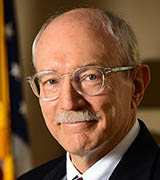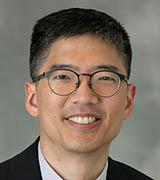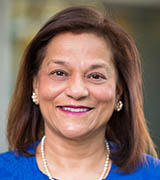News Briefs
New Directors at Five Institutes
Welcome five new institute directors: Rick Woychik (NIEHS), Shannon Zenk (NINR), Michael Chiang (NEI), Lindsey Criswell (NIAMS), and Rena N. D’Souza (NIDCR).
Rick Woychik, Ph.D., National Institute of Environmental Health Sciences (NIEHS)

NIEHS’s new director, Rick Woychik, will lead NIH’s research efforts on environmental influences on human health and also serve as director of the U.S. National Toxicology Program. He became the official director in June 2020, after having served as the acting director after Linda Birnbaum retired in October 2019.
Woychik’s research accomplishments are many: His laboratory was the first to identify a gene associated with polycystic kidney disease, the first to connect a protocadherin gene to hearing loss in Cushing disease patients, and the first to clone an obesity-related gene called agouti.
Before coming to NIEHS as deputy director in 2010, Woychik served nearly 10 years as the president and CEO of the Jackson Laboratory (Bar Harbor, Maine). There, he oversaw seven major building projects in Maine and California; enhanced the organization’s focus on basic mechanistic research in model organisms with a focus on translation to human health and disease; established the Genetics Resource Science division; and oversaw a major realignment of the nonprofit business unit to substantially improve efficiency and outreach to the global biomedical community.
He earned his Ph.D. in molecular biology from Case Western Reserve University (Cleveland, Ohio) and then moved into the field of molecular genetics during his postdoctoral training in Philip Leder’s laboratory in the Department of Genetics at Harvard Medical School (Boston).
Shannon Zenk, Ph.D., M.P.H., R.N., F.A.A.N., National Institute of Nursing Research (NINR)

A registered nurse and leading nurse researcher at the University of Illinois at Chicago (UIC) College of Nursing (Chicago) will take the helm as the new director of NINR in September 2020: Shannon Zenk. She is a professor in UIC’s Department of Population Health Nursing Science and a fellow at the UIC Institute for Health Research and Policy. She succeeds Patricia Grady, who retired in 2018. (Tara A. Schwetz, an associate deputy director in the NIH Office of the Director, has been acting director.)
In her research on social inequities and health, Zenk is identifying effective, multilevel approaches to improve health and eliminate racial, ethnic, and socioeconomic health disparities. Her research portfolio includes NIH-supported work into urban food environments, community-health solutions, and veterans’ health. Through pioneering research on the built environment and food deserts, she and her colleagues helped bring national attention to the problem of inadequate access to healthful foods in low-income and Black neighborhoods.
Zenk, an elected fellow of the American Academy of Nursing and a member of the International Nurse Researchers Hall of Fame, earned her bachelor’s in nursing from Illinois Wesleyan University (Bloomington, Illinois), her master’s degrees in public-health nursing and community-health sciences from UIC, and her doctorate in health behavior and health education from the University of Michigan (Ann Arbor, Michigan).
Michael Chiang, M.D., National Eye Institute (NEI)

Michael Chiang, who will begin as the new director of NEI in late 2020, is a practicing ophthalmologist, a professor of ophthalmology and medical informatics and clinical epidemiology at Oregon Health and Science University, OHSU (Portland, Oregon), and associate director of the OHSU Casey Eye Institute. He succeeds former NEI Director Paul Sieving, who retired in 2019 to launch and direct a new Center for Ocular Regenerative Therapy at the University of California, Davis (Davis, California). (NEI Deputy Director Santa J. Tumminia has been acting director.)
Chiang’s research involves telemedicine and artificial intelligence for the diagnosis of retinopathy of prematurity and other ophthalmic diseases, implementation and evaluation of electronic health-record systems, modeling of clinical workflow, and data analytics. He has been a principal investigator on many NIH grants since 2003, and his clinical practice focuses on pediatric ophthalmology and adult strabismus.
He has held many positions in professional societies, is an associate editor for the Journal of the American Medical Informatics Association, and serves on other editorial boards. He earned a bachelor’s in electrical engineering and biology from Stanford University (Stanford, California); a master’s degree in biomedical informatics from Columbia University College of Physicians and Surgeons (New York); and an M.D. and master’s in medical science from Harvard Medical School and Harvard-MIT Division of Health Sciences and Technology (Boston). He completed a residency and pediatric ophthalmology fellowship training at the Johns Hopkins Wilmer Eye Institute (Baltimore).
Lindsey Criswell, M.D., M.P.H., D.Sc., National Institute of Arthritis and Musculoskeletal and Skin Diseases (NIAMS)

NIAMS’s new director is rheumatologist Lindsey Criswell, vice chancellor of research at the University of California, San Francisco (UCSF), a professor of rheumatology in UCSF’s Department of Medicine, and professor of orofacial sciences in its School of Dentistry. She succeeds long-time director Stephen Katz, who passed away suddenly in December 2018. (Robert H. Carter has been serving as acting director since then.) Criswell expects to begin her now role in early 2021.
She is interested in the genetics and epidemiology of human autoimmune disease, particularly rheumatoid arthritis and systemic lupus erythematosus. Using genome-wide association and other genetic studies, her research team contributed to the identification of more than 30 genes linked to these disorders.
After obtaining a bachelor’s degree in genetics and a master’s degree in public health from the University of California, Berkeley, she went on to earn a D.Sc. in genetic epidemiology from the Netherlands Institute for Health Sciences (Rotterdam) and an M.D. from UCSF, and she completed a residency in internal medicine and a fellowship in rheumatology. She has received many honors for her work and is certified as a first responder in wilderness medicine.
Rena N. D’Souza, D.D.S., M.S., Ph.D., National Institute of Dental and Craniofacial Research (NIDCR)

Rena N. D’Souza, assistant vice president for academic affairs and education for health sciences at the University of Utah (Salt Lake City), will begin as NIDCR director later this year. She is also a licensed dentist and holds faculty positions at the university’s School of Medicine and the Department of Biomedical Engineering. She succeeds Martha Somerman, who retired as NIDCR director at the end of 2019. (NIH Principal Deputy Director Lawrence A. Tabak has been acting director.)
D’Souza’s research focuses on developmental biology and genetics; matrix biology; biomaterials, tissue engineering, and stem cells; and clinical research. Her group’s discovery that a novel mutation in PAX9 was responsible for a severe form of human tooth agenesis opened a new field of research to discover genes and mutations as well as therapies for common human inherited disorders of the craniofacial complex.
She has received many honors including being chosen as the inaugural dean of the University of Utah’s School of Dentistry (established in 2012); being elected as president of the American Association for Dental Research and the International Association for Dental Research; and serving on the NIH Advisory Committee to the Director (2013–2014). She received her bachelor’s degree in dental surgery from the University of Bombay (now the University of Mumbai in Mumbai, India), after which she completed her general-practice residency. She earned her D.D.S., Ph.D., and master’s degrees in pathology/biomedical sciences from the University of Texas Health Science Center (Houston).
This page was last updated on Tuesday, March 22, 2022
